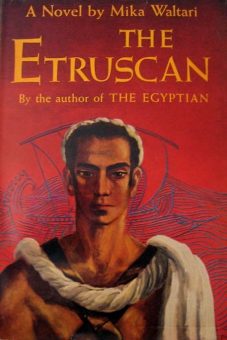2.
Mikon remained with us for a year, and the Siccanians brought their sick from near and far to be healed. But he practiced his profession carelessly and declared that the Siccanian priests were fully as capable as he of healing wounds, putting broken bones in splints and submerging the sick into a curative sleep with the sound of a small drum.
“I have nothing to learn from them,” he said, “nor they from me. Nothing makes any difference. Perhaps it is proper to relieve the pains of the body, but who will heal the suffering spirit, when not even one who is consecrated can find peace in his heart?”
I could not cheer him in his depression. One morning, having awakened late, Mikon looked at the blue mountains and radiant sunshine, touched the grass, breathed the warm fragrance of the forest and took my hand in his own trembling hands.
“This is my moment of clarity,” he said. “I am enough of a physician to know that I am either ill or slowly being poisoned by the Siccanian potion. I am living in a haze and can no longer distinguish the real from the unreal. But perhaps the worlds are passing one another or are within one another so that at times I can live in two worlds simultaneously.”
He gave me one of his rare smiles. “My moment of clarity must have little significance since I see you supernaturally tall, and your body glows like fire through your clothes. But ever since I first began to think, I have pondered the meaning of everything. For that reason I became consecrated and learned much that was beyond this reality. But even such secret knowledge is limited. Only the Siccanians’ poisonous potion has provided me with the answer to why I was born and what the purpose of life is.”
He released my hand, again touched the grass and looked at the blue mountains and said, “I should rejoice at my knowledge, but nothing gladdens me. It is as though I had run too long a distance. I am not consoled by the thought that some day I will awaken again, that the earth will be green and beautiful and that it will be a joy to live.”
I looked at him pityingly, but as I looked I saw death behind his swollen face. I wanted to be kind to him because he was my friend, but he was angered by my look.
“You don’t have to pity me,” he said sharply. “You don’t have to pity anyone, because you are what you are. Showing me pity is an affront, for I have served as a herald for you if nothing more. I ask only that you recognize me again when next we meet. That will suffice.”
At that moment his swollen face was ugly in my eyes, and the envy that shone from it darkened the radiant dawn. Realizing it himself, he covered his eyes, rose, and walked away with uncertain steps.
When I tried to restrain him he said, “My throat is dry. I am going to the stream to drink.”
I wanted to lead him there but he repulsed me angrily and did not look back. Nor did he return from the stream. We sought him in vain and the Siccanians looked for him in the thickets and gorges until I realized that he had meant another stream.
I did not condemn his action but as a friend granted him the choice of continuing this life or of ending it like a task that has grown too heavy. After we had mourned him we made a sacrifice to his memory, and thereafter I felt greatly unburdened, for his melancholy had long thrown a shadow over our lives. But Hiuls missed him greatly, for he had taught the boy to walk, listened to his first words, and whittled playthings with his sharp physician’s knife.
When she realized what had happened, Arsinoe became indignant and blamed me for not keeping an eye on Mikon.
“I don’t care about his death,” she said, “but at least he could have waited until I had given birth to the child and could have helped me. He knew well that I am pregnant again and I would have wanted to give birth in a civilized manner without depending on these Siccanian hags.”
I did not reproach Arsinoe for her unkind words, for pregnancy made her capricious, and Mikon could in truth have waited yet a few months for the sake of our friendship. In due time Arsinoe gave birth effortlessly to a daughter without the aid of the experienced Siccanian women, although she succeeded in disrupting the entire tribe for the period of the birth. She refused to use a chair with a hole, as the Siccanian women urged her to do, but like a civilized person insisted on giving birth to her child in bed.
Pages: 1 2 3 4 5 6 7 8 9 10 11 12 13 14 15 16 17 18 19 20 21 22 23 24 25 26 27 28 29 30 31 32 33 34 35 36 37 38 39 40 41 42 43 44 45 46 47 48 49 50 51 52 53 54 55 56 57 58 59 60 61 62




